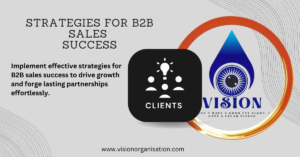Strategies for B2B Sales Success: Introduction –
The Art of the B2B Sale: Strategies for Building Relationships and Closing Deals
The B2B sales landscape is a complex dance of logic, relationship building, and strategic decision-making. Unlike strategies for B2B sales success, success hinges on understanding the unique needs and challenges of businesses, forging long-term partnerships, and delivering solutions that drive measurable results.
This blog will equip you with the essential strategies to navigate the B2B sales landscape and achieve sustainable success. We’ll delve into the art of building trust, crafting compelling value propositions, and closing deals that benefit both you and your customer.
Understanding the B2B Buyer’s Journey
Multiple Decision-Makers: Unlike B2C sales, B2B purchases often involve committees or teams with various decision-making criteria and priorities.
Focus on ROI: B2B buyers prioritize the demonstrable financial benefits your offering delivers. They seek a clear understanding of the return on investment (ROI) your solution provides.
Extensive Research: B2B buyers conduct thorough research, comparing solutions and seeking data-driven justification for their purchase decisions.
Long Sales Cycles: The B2B sales cycle can be lengthy, involving multiple touchpoints and nurturing leads before reaching a purchase decision.
Building Relationships: The Cornerstone of B2B Sales Success
Become an Industry Expert: Deepen your knowledge of your industry and your customer’s specific challenges. Build trust by becoming a valuable partner, not just a salesperson. A consultative approach allows you to offer insightful recommendations that empower them to make informed decisions. Actively listen to understand their challenges and offer valuable insights and solutions tailored to their specific needs.
Active Listening is Key: Pay close attention to customer concerns, needs, and pain points. Ask insightful questions and demonstrate a genuine desire to understand their business.
Personalization Matters: Tailor your communication and value proposition to address the specific needs and challenges faced by each prospect.
Focus on Long-Term Partnerships: Don’t just focus on the immediate sale. Cultivate long-term relationships by demonstrating your commitment to their success.
Crafting a Compelling Value Proposition
Focus on Business Outcomes: Don’t just list features. Explain how your product or service will translate into concrete business benefits for the customer, such as increased efficiency, cost savings, or improved customer satisfaction.
Quantify the Impact: Whenever possible, use data and metrics to quantify the positive impact your solution will have on the customer’s business. Strategies for B2B Sales Success.
Address Pain Points Directly: Clearly articulate how your offering addresses the specific challenges and pain points identified during your conversations with potential clients. Strategies for B2B Sales Success.
Showcase Customer Success Stories: Highlight case studies and testimonials from satisfied customers within their industry to demonstrate the effectiveness of your solution. Strategies for B2B Sales Success.
Closing the Deal: The Art of Negotiation and Follow-Up
Negotiation and follow-up are crucial steps in securing a B2B sale. Here’s how to excel :
Prepare for Negotiation: Anticipate potential objections and prepare persuasive counter-arguments. Embrace a collaborative negotiation style, seeking mutually beneficial solutions that address both your needs and theirs.
Follow-Up Consistently: Maintain consistent communication throughout the sales cycle and after the deal is closed. Proactively address concerns and demonstrate ongoing commitment to their success.
Focus on Building Trust: Negotiation is not about confrontation. Maintain a collaborative and professional approach that fosters trust and strengthens your relationship with the client.
Essential Tools and Technologies for B2B Sales Success
Customer Relationship Management (CRM) Systems: CRMs centralize customer data, streamline communication, and provide valuable insights throughout the sales cycle.
Sales Enablement Tools: These tools equip your team with content, resources, and training to deliver impactful sales presentations and address customer inquiries effectively.
Sales Automation Platforms: Automation tools can streamline repetitive tasks like data entry, email outreach, and scheduling, freeing up valuable time for your team to focus on high-value activities.
Data Analytics and Reporting Tools: Gain valuable insights into sales performance, identify trends, and make data-driven decisions to optimize your B2B sales strategy. Strategies for B2B Sales Success.

Conclusion: Building Trust and Delivering Value
B2B sales success goes beyond simply closing deals. It’s about forging long-term partnerships, building trust, and delivering solutions that drive measurable value for your customers. Strategies for B2B Sales Success.

